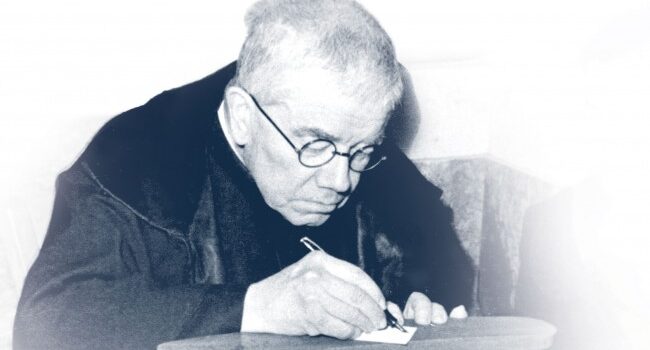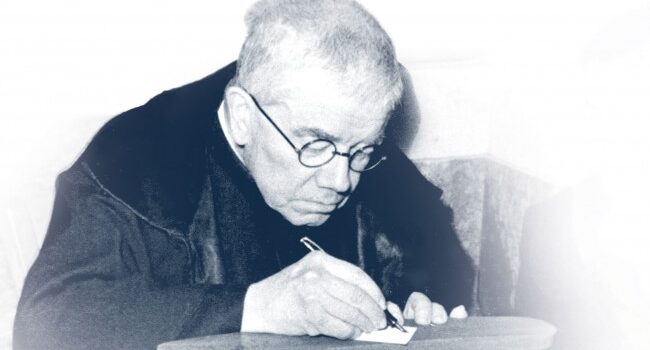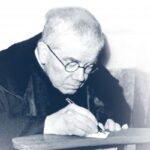“My whole life, at its essence, has been nothing other than a series of countless instances of extraordinary graces alongside agonizing miseries,” Servant of God Don Dolindo Ruotolo once said, in an autobiography he wrote in 1923 out of obedience to his confessors. “This is the summation of the lives of many souls.”
From his father, Raffaele Ruotolo, he had received at birth the highly unusual name “Dolindo,” which means “pain” and “suffering.” Raffaele thought the name up himself, and it proved to be prophetic, as Dolindo’s life was filled with suffering from beginning to end.
Yet paradoxically, Don Dolindo considered his suffering to be a beautiful gift from God.
“I asked Jesus for the gift of suffering,” he writes in his autobiography. “Every morning I asked Him for love, suffering, humility, faith, meekness, generosity, and patience. Suffering did not delay in arriving and has never left me from that moment on, but has continued to grow, and this is the most beautiful gift that my Lord has given me.”
His love for suffering was rooted in his unquenchable desire to abandon Himself entirely to God’s love with no trace of worldly attachments.
“My soul is like a passion flower:” he explains in his autobiography, “it blooms in suffering and hardship but withers quickly in prosperity. This God knows all too well.”
His first taste of suffering came when he was not even a year old and had to endure painful surgeries on both of his hands, to extract decaying bone, and on his cheek, to remove a tumor.
But even worse was the suffering he endured from his father, who was so stingy that he refused to spend money on proper food and clothing for his children, and so punitive that young Dolindo would run and hide himself in a desk drawer when he heard his father coming home.
Despite his trials—or perhaps because of them—Dolindo was a contemplative child who had a special devotion to Jesus’ sufferings in the Passion and, after receiving his First Communion, began practicing secret penances and waking before sunrise to walk to the local church for early morning Mass.
Meanwhile, Raffaele refused to send his children to school. Instead, he forced Dolindo and his older brother, Elio, to memorize information taught to them by their older sisters at home. The boys were not permitted to eat until they had recited everything they had learned, and each evening after their father looked over their schoolwork, they would receive a beating. Though young Dolindo studied hard in order to recite the required lessons, he understood nothing of what he was learning. Between the hunger and the beatings, his poor mind had shut down.
“I must say that those endless days of suffering and severe punishments, with no respite or reprieve, so extreme for a child of tender years, resulted in reducing me to a complete and utter imbecile,” he writes. “I was no longer able to understand anything.”
When Raffaele finally gave in and allowed the boys to attend junior high, Dolindo twice failed his entrance exams, later failed his final exams, and finally had to repeat the school year.
Eventually, his parents separated—an extremely uncommon occurrence at that time—and Dolindo was sent to boarding school.
“I was still in a blur and oblivious to what was going on around me,” Dolindo remembers in his autobiography. “I … quickly became notorious for my stupidity. As always, I did well with memory work, but where intelligence and reflection were required, I was completely incompetent.”

Then, on June 15, 1896, everything changed.
On that day, Dolindo had donned a clerical vestment (as the school was a formation house for future priests), and was reciting the Rosary with his classmates. Before him, he had a copy of this image of the Blessed Mother:
What happened next was so important to him that, in addition to writing about it in his autobiography in 1923, he also wrote the story in 1956 on the back of this holy card that bore the same image of Our Lady.

On that June day, when Dolindo was 13 years old, the image of Our Lady was leaning against a book in front of him. He gazed at the image and prayed: “O, my dear Mother! If you want me to become a priest, then give me the intelligence, because, as you can see, I’m utterly stupid.”
As he knelt there, he was overcome by sleepiness and dozed off. Suddenly, the image moved—“due to the wind or some special grace, I couldn’t say”—and touched his forehead. At that moment, he was awakened from his stupor with his mind sharp, alive, and lucid.
“I could talk about anything and could speak poetically,” he writes on the holy card. “I was a different person. But then, as it is now, only for everything that glorifies God. For all the rest, I was and remain a true stupid person.”
After this miraculous, instantaneous infusion of intelligence, Dolindo soon earned a new nickname in school: “The Encyclopedia.” He composed poems, plays, papers, and essays that received praise and admiration, and quickly rose to the academic top of the entire school.
“Little did they know,” he writes in his autobiography, “that it was all totally a gift straight from God!”
This grace of intelligence was to remain with him for the rest of his life, and is evidenced in his prolific and brilliant writings, which continue to touch many hearts today.
When obliged to write about his painful childhood memories in 1923, years after his father had passed away, Don Dolindo said that his “poor father meant well.” He blessed his father’s memory and prayed he would be in God’s glory.
Acknowledgement and special thanks to Maria Palma Smith for the use of her English translation of the book Amore, Dolindo, Dolore (Casa Mariana Editrice “Apostolato Stampa”, 2001). Publication of the English translation is forthcoming from Academy of the Immaculate Publishing.
Thanks also to another special friend of Don Dolindo for providing a translation of the holy card.













